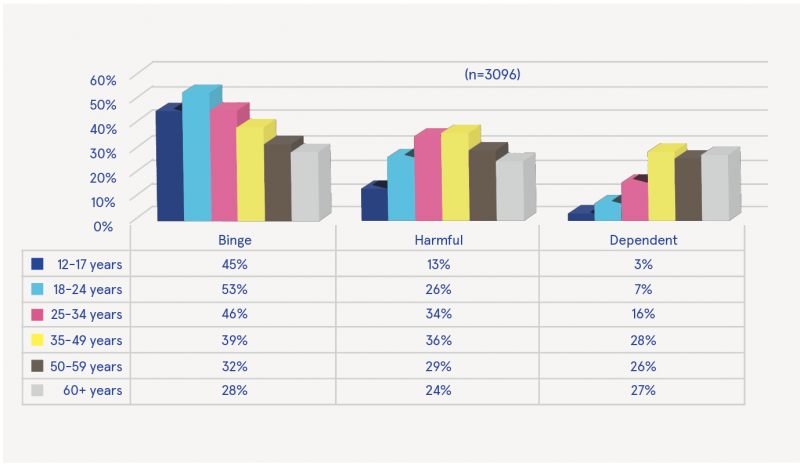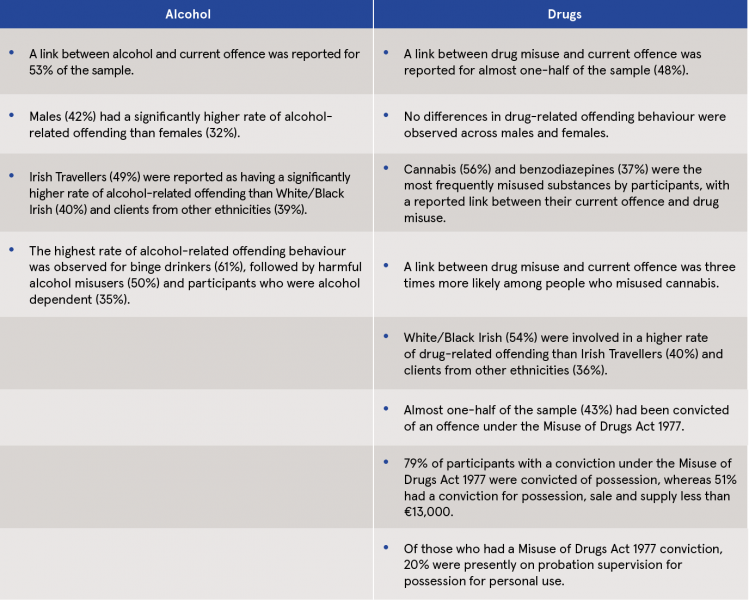Guiney, Ciara (2022) Drug and alcohol misuse among people on probation supervision. Drugnet Ireland, Issue 82, Summer 2022, pp. 26-29.
| Preview | Title | Contact |
|---|---|---|
|
PDF (Drugnet Ireland 82)
661kB |
On 11 November 2021, Minister for Justice Helen McEntee TD launched the report Informing and supporting change: drug and alcohol misuse among people on probation supervision in Ireland.1,2,3 The report was written by Dr Louise Rooney of University College Dublin.2 The study built on research examining alcohol and drug misuse in individuals referred for probation supervision in 2011/12.4 The aim of the current research was to examine the prevalence of alcohol and substance misuse in similar subjects with the view to developing best practice and to help manage and prioritise Probation Service resources.2
Methodology
This study used a cross-sectional quantitative design. Probation officers from community-based supervision teams (n=218) were invited to complete a survey for clients on their caseload who were subject to a probation order, supervision order, adjourned supervision, or supervised temporary release. The response rate was 81%. Clients on community service orders or those referred for pre-sentence reports were excluded from this survey. Survey questions addressed four main areas: background details; details of drug use; details of alcohol use; and gateways–influences context. An extensive analysis was conducted using Statistics Package for the Social Sciences (SPSS) software.
Results
Demographics
Overall, 3,096 surveys were completed by probation officers, of which a 4:1 gender ratio was shown (male = 2566; female = 522). The majority of the sample were categorised as 18–24 years, 25–34 years, and 35–49 years, 24%, 34%, and 27%, respectively. Clients were categorised as mainly White Irish (80%) and Irish Traveller (11%).2
Drug and alcohol misuse prevalence
The majority of clients indicated that they had misused drugs or alcohol at some stage during their lifetime (81%), of which 67% misused drugs and 64% misused alcohol. Clients who reported drug and alcohol misuse combined accounted for 50% of the sample.2 Clients aged between 25 and 34 years were considered most at risk. The highest level of no substance misuse was recorded in Young Persons Probation (22%) and Irish Travellers (18%).2
Nature and frequency – alcohol misuse
While no gender differences were found for alcohol dependence, males were more likely to participate in binge (56%) and harmful (38%) drinking than females (binge 36%; harmful 27%). Figure 1 presents a breakdown of type of alcohol misuse by age. Binge drinking was highest in clients aged 18–24 years (53%), followed by those aged 25–34 years (46%) and 12–17 years (45%). Harmful drinking was highest in those aged 35–49 years (36%), followed by those aged 25–34 years (34%). High levels of dependency were shown in clients aged 35–49 years (28%), followed by those aged 60+ (27%) and 50–59 years (26%).
Nature and frequency – drug abuse
- Several key findings emerged from the analysis.2
- Cannabis (84%) was the most common substance used by probation clients, followed by benzodiazepines (55%), cocaine (48%), and heroin (41%).
- 21% of drug misusers reported the misuse of two substances, while 20% reported the misuse of three substances.
- Cannabis misuse was highest among 18–24-year-olds (65%).
- Benzodiazepine misuse was highest among 18–24-year-olds (41%).
- Cocaine misuse was most prevalent among 25–35-year-olds (41%).
- Ecstasy misuse was highest among 25–43-year-olds (23%).
- Heroin misuse was most prevalent among 35–49-year-olds (42%).
- Males were more likely to misuse cocaine, ecstasy, and cannabis than females. Alternatively, females were more likely to misuse heroin than males.
- 5% of probation clients reported history of a drug overdose.
- 7% of probation clients reported intravenous drug misuse.
- Over one-half of intravenous drug misusers (52%) began injecting drugs between the ages at 18–24 years, 18% at 12–17 years, and 15% at 25–34 years.2

Source: Rooney (2021), Figure 4.17, p. 47
Figure 1: Type of alcohol misuse by age
Substance misuse and offending behaviour
Table 1 provides an outline of the key findings for alcohol and drug abuse.
Table 1: Key findings for alcohol and drug misuse behaviour

Limitations of study
Several methodological limitations were identified by the authors of the study.
- Surveys completed by probation officers were centred on information in case files and not from clients directly.
- The level of information contained in the case files would have been influenced by the length of time the client received probation supervision and how well they engaged with supervision.
- Hence, there were gaps in the information provided.
Recommendations
Based on the findings of this research, several recommendations were put forward that will inform future policy and practice in the Probation Service.
- Interagency cooperation: Synergies should continue to be strengthened with other Government agencies, the Health Service Executive, and other community services.
- Service mapping: The misuse of drug and alcohol in Probation Service clients is a problem across Ireland. Hence, a needs analysis should be conducted to identify and address gaps in service supports and interventions.
- Service review: Probation Service-funded projects providing specialist supports and interventions should be reviewed to examine their alignment and interconnectedness with the national drugs strategy.
- Substance misuse and mental illness: Collaboration with multidisciplinary and out-of-reach services should address the needs of individuals that experience substance misuse alongside mental illness.
- Information technology (IT) development: The current IT system should be modernised and updated to ensure that policy and practice is evidence based and data driven. Developing online platforms that are based on existing research would enhance probation supervision and provide substance misuse supports and interventions, thus increasing service access.
- Research and evaluation: To ensure that policy and practices are evidence based, a structured method of research should analyse Probation Service data and evaluate existing services and training. The findings should be disseminated and collaboration with key stakeholders conducted to progress recommendations.
- Policy development: The Probation Service should continue its commitment to maintaining a progressive, current policy that is informed by international best practice.
- Training: Probation officers should receive training to enhance their knowledge and skills in responding to clients that present with substance misuse problems, to work in partnership with service providers, and to maintain best practice standards.2
Conclusion
This research was welcomed by Minister McEntee and the Minister of State Frank Feighan TD. Minister McEntee acknowledged that ‘high quality research’ is critical to enhancing greater understanding of the issues so that ‘stronger evidence based policies’ and interventions are developed.1 While the Minister of State believed that the findings are aligned with the promotion of a public health approach to the drug use objective on the national drugs strategy,5 he acknowledged the importance of promoting alternatives to coercive sanctions for individuals committing drug-related offences and highlighted the need for more community services targeting this group. Director of the Probation Service, Mark Wilson, stated that a ‘detailed work plan to address the needs and key recommendations outlined in the study’ will be developed.1
1 The Probation Service (2021) Minister for Justice Helen McEntee, Minister of State, Frank Feighan and Director of the Probation Service Mark Wilson welcome the publication of Research Report on Drugs and Alcohol Misuse [Press release]. 11 November 2021. Dublin: The Probation Service. Available online at: http://www.probation.ie/EN/PB//WebPages/WP21000023
2 Rooney L (2021) Informing and supporting change: drug and alcohol misuse among people on probation supervision in Ireland. Dublin: The Probation Service. https://www.drugsandalcohol.ie/35133/
3 Rooney L (2021) Substance misuse and supervision: an examination of drug and alcohol misuse among probation service clients. Irish Probation Journal, 18 (October): 137–158. https://www.drugsandalcohol.ie/35227/
4 The Probation Service (2012) Drug and alcohol misuse among adult offenders on probation supervision in Ireland: findings from the Drugs and Alcohol Survey 2011. Navan: The Probation Service. https://www.drugsandalcohol.ie/18746/
5 Drugs Policy Unit, Department of Health (2019) Reducing Harm, Supporting Recovery: progress 2018 and planned activity 2019. Dublin: Department of Health. https://www.drugsandalcohol.ie/30660/
J Health care, prevention, harm reduction and treatment > Risk and protective factors > Risk factors
MM-MO Crime and law > Criminal penalty / sentence > Community service > Probation or parole
T Demographic characteristics > Person who commits a criminal offence (offender)
VA Geographic area > Europe > Ireland
Repository Staff Only: item control page